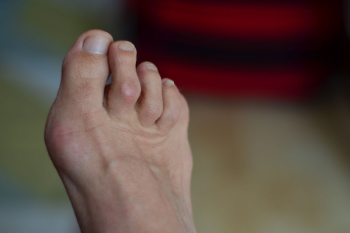
Hammertoes are a deformity where one or more toes become bent at the middle joint, resembling a hammer. This condition often affects the second, third, or fourth toes and can lead to pain, stiffness, and difficulty wearing shoes. Common symptoms include visible toe bending, discomfort, corns or calluses from friction with footwear, and limited range of motion in the affected toes. Hammertoes develop due to muscle imbalances in the foot, often caused by wearing tight or ill-fitting shoes, injury, or conditions like arthritis or diabetes. Left untreated, hammertoes can worsen, leading to complications such as open sores, infections, or permanent joint damage. Treatment options vary depending on severity, from conservative approaches such as wearing roomier shoes to surgical correction in more advanced cases. If you have a hammertoe, it is suggested that you visit a podiatrist as early intervention can alleviate discomfort and prevent further deformity.
Hammertoes can be a painful condition to live with. For more information, contact Kenneth Donovan, DPM of Advanced Care Foot and Ankle. Our doctor will answer any of your foot- and ankle-related questions.
Hammertoe
Hammertoe is a foot deformity that occurs due to an imbalance in the muscles, tendons, or ligaments that normally hold the toe straight. It can be caused by the type of shoes you wear, your foot structure, trauma, and certain disease processes.
Symptoms
- Painful and/or difficult toe movement
- Swelling
- Joint stiffness
- Calluses/Corns
- Physical deformity
Risk Factors
- Age – The risk of hammertoe increases with age
- Sex – Women are more likely to have hammertoe compared to men
- Toe Length – You are more likely to develop hammertoe if your second toe is longer than your big toe
- Certain Diseases – Arthritis and diabetes may make you more likely to develop hammertoe
Treatment
If you have hammertoe, you should change into a more comfortable shoe that provides enough room for your toes. Exercises such as picking up marbles may strengthen and stretch your toe muscles. Nevertheless, it is important to seek assistance from a podiatrist in order to determine the severity of your hammertoe and see which treatment option will work best for you.
If you have any questions, please feel free to contact our office located in Charleston, SC . We offer the newest diagnostic and treatment technologies for all your foot care needs.
